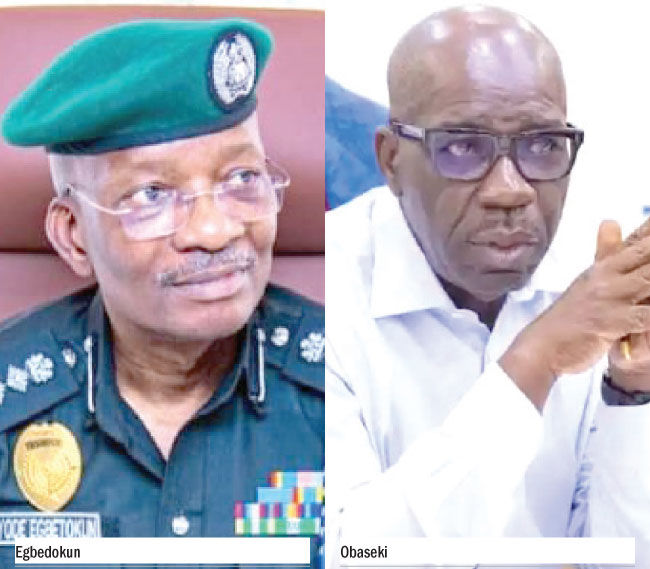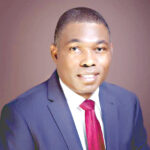South South/South East Bureau Chief, ‘SUYI AYODELE examines why the off-season governorship election coming up in Edo State today is militarised with Edo State turning to a near police-state.
From Ososo in the Kukuruki hillsides on the Northern side, to the remotest village of Iyeke-Orhionmwon in the South; from the Illushi watersides of Esanland in the Central Senatorial District, to Fugar, the centre of the Etsako clan, and from Ivbiaro to Sabongida Ora of the Owan enclave, the tension in the Heartbeat of the nation, Edo State, is palpable. Every corner one turns, there are contingents of armed state security personnel. At the last count, no fewer than 35,000 combat-ready policemen were in deployment in the 18 local government areas of the state. In addition, 6,433 personnel of the Nigeria Security and Civil Defence Corps (NSCDC), were on guard to complement the police. The numbers of officers and men of the Nigerian Army, Navy and the Air Force, drafted to the state were not disclosed. This is just as hooded and non-hooded men of the State Security Service (SSS) have flooded the state. The cities and town centres, including the villages and everywhere inhabited by human beings, wear a sombre look. The situation could be mistaken for a war zone. But Edo State is not at war, though in a war mood. The state, today, Saturday, September 21, 2024, is merely experiencing another cycle of election.
The Edo State governorship election which is holding today in all the towns and villages in the 18 council areas of the state is known in the Nigerian election parlance as an off-season election. It is off-season to the extent that it is an isolated election strictly for the state, whose political arrangement was altered on November 11, 2008, when the Court of Appeal declared the 2007 election that produced Professor Oseriemen Osunbor of the Peoples Democratic Party, (PDP), as the governor of the state, invalid. In his stead, Comrade Adams Oshiomhole of the then Action Congress (AC), was declared winner, and ordered to be sworn in. The court further ruled that Oshiomhole would be deemed to have assumed office on the date he was sworn in, and his four-year term would begin on that day. With that pronouncement, Edo State left the league of states which hold their elections on the same day, to hold an isolated election a year after the general election. Thus, the former Labour Leader took the oath of office on November 12, 2008, and completed his second term in office on November 11, 2016.
The peace of the state has always been on tenterhooks whenever an off-season election is in the offing. The reason, Saturday Tribune gathered, was largely because every four years after Oshiomhole completed his first term in 2012, the state has always been in opposition to the party in government at the centre. Oshiomhole contested as the defunct Action Congress of Nigeria (ACN) candidate in 2012, the PDP was the government in power with president Goodluck Ebele Jonathan as the President. The pattern only changed slightly in 2016, when the ex-Labour leader was to hand over to his successor, Governor Godwin Obaseki. The election then was run with Obaseki as the candidate of the newly formed coalition of opposition parties, the All Progressives Congress (APC), which defeated the PDP at the centre in the 2025 general election.
But by the time Obaseki was seeking his second term in another off-season election in 2020, the political calculation in the state had changed with a reversal of status. While Oshiomhole held sway as the National Chairman of the APC and leveraged on his influence then to ship Obaseki out of the party with disqualification when he sought the nod of the APC for his second term, Obaseki on his own changed camp and dumped the ruling APC at the centre for the opposition PDP, becoming its candidate. By that political cross-pollination, Obaseki then had the 2016 PDP candidate, Pastor Osagie Ize-Iyamu to contend with as the APC flag bearer in the 2020 contest. Thus, the September 22, 2020, election in the state witnessed what a political analyst, Idubor Okungbowa, termed as “the most divisive and militarised election in the history of Edo.”
Oshiomhole vs Obaseki
That description of the 2020 governorship poll in the state has since paled into insignificance, with the level of militarisation of today’s election in the hitherto peaceful state which prides itself with the descriptive cliche of “Edo people are one family”. Okungbowa, while speaking to the tense atmosphere that has characterised today’s election said: “What we are witnessing is the personality clash between Obaseki and Oshiomhole. This election is taking this dimension because the two gladiators are behaving as if they are the ones contesting. If the PDP won the election, Oshiomhole is gone. Likewise, if the APC won at the end of the day, you don’t need anyone to tell you that Obaseki is extinguished politically, and completely. So, it is about the two people and not about an average Edo man or woman.”
Okungbowa could not have been far from the truth. The two gladiators, Oshiomhole and Obaseki, he referenced, are the two backers of the candidates of the two notable political parties in the contest, Asue Ighodalo of the PDP and Senator Monday Okpebholo of the APC. On the campaign rostrums, Obaseki and Oshiomhole have never left anyone in doubt that today’s election is a do or die affair and the survival of the two godfathers. This is the lead that the supporters of both men, and to a greater extension, the supporters of the two political parties, have taken and the state is a state of what the iconic scholar, Wole Soyinka, described in the epic novel, “Forest of a Thousand Deamons”, as “higgledy-piggledy, topsy-turvy.”
Speaking to the tensed atmosphere pervading the entire state, TAF Africa, one of the non-state actors monitoring the election, with reference to the inclusion of Persons Living with Disabilities (PWDs), at a press conference held on Friday, a few hours to the election, said that the drop in the percentage of voters participation in the 2016 and 2020 elections could be traced to the issue of security concern. The group said inter alia: “The declining voter turnout in previous elections (from 32% in 2016 to 27% in 2020) coupled with ongoing economic and security challenges, may result in further apathy. The likelihood of election-related violence also presents a significant concern for the safety and mobility of persons with disabilities. This is largely due to the perceived irregularities in previous elections and security volatility. Addressing this trust deficit requires proactive action from INEC and other stakeholders to build confidence in the integrity of the electoral process.”
Fear of irregularities, violence
Saturday Tribune gathered that what has heightened the sense of insecurity in the state is the fear of the election being marred by massive irregularities. In the last three weeks, the PDP and the APC had been at each other’s throats with allegations and counter allegations of plans to undermine the integrity of the election. The matter came to a head penultimate Thursday, when the PDP refused to sign the Peace Accord organised by the General Abdulsalami Abubakar (Rtd)- led National Peace Accord Committee (NPAC), on the grounds that the police were hounding its members to detention. This was just as Governor Obaseki, at the grand rally of the PDP, said that the threat of “Federal might”, an allusion to underhand dealings, by the APC, amounted to an “existential threat”, and declared that the contest, if marred by any wild imaginary of irregularity, would be “do and die.”
Until Wednesday, when the 10 PDP members arrested in connection with July 18, 20204, killing of a Police Inspector, Akor Anuh, in Benin City, were released from detention after their arraignment in the outskirts of Abuja, the party claimed that no fewer than 23 of its members and supporters were arrested. This was just as the APC on its part was also calling for the arrest and detention of PDP leaders, whom the party claimed had links with the July incident, and the potential to cause mayhem if left unfettered. That has been the apprehension in the state.
The assurances by the security agencies, especially by the Police, that there would be an impartial policing of the state before, during and after the election, has not been able to douse the tension. Edo State Chairman of the PDP, Dr Tony Aziegbemi, at a press conference earlier last week, said that the party had lost confidence in the ability of the police to rise above the waters of partisanship because the “Inspector General of Police is grossly biased.” Just on Wednesday evening, the rumour trended for hours that the Director General of the PDP Governorship Campaign Council, Matthew, Iduoriyekemwen, had been picked up before the rumour was dispelled by a PDP member, who, while pleading anonymity, said “Major (Iduoriyekhemwen’s appellation) was not arrested. Yes, I can confirm that someone in the security circle got in touch with him, but after he explained himself, I think they were satisfied with what he told them.”
The greatest of the concerns in the state was last Sunday’s alarm by the Edo State Government that plans were afloat to redeploy all the security officials attached to Governor Obaseki in order to leave him without protection and render him vulnerable ahead of today’s election. The Commissioner for Communication and Orientation, Chris Nehikhare, who raised the alarm appealed to the nation’s leadership of the Civil Society Organisations (CSOs), and diplomatic corps to pay close attention to the happenings in the state. But the APC dismissed the claim as unfounded. A chieftain of the party, Charles Idahosa, who served as Special Adviser, Political, to Oshiomhole, said that Obaseki was merely suffering from the fear of intimidation because “this is the first time Obaseki will be running an election on his own.”
The prevailing situation in the state is trepidation. Not a few people are worried about the possibility of outbreak of violence today. For instance, a Civil Society Organization, (CSO), Yiaga Africa, on Thursday identified eight council areas as flashpoints for violence and urged security agencies to ensure adequate deployment of personnel to cover all the identified areas. The group listed the councils as Ikpoba/Okha, Oredo, Egor, Ovia South-West, Ovia North-East, Esan South-East, Etsako West and Etsako East Local Government Areas of the state.
The situation notwithstanding, the Deputy Inspector General of Police (DIG) in charge of the police contingent for the election, Frank Mba, on Wednesday said that enough officers and men had been deployed to the state to ensure a hitch-free election. How his assurance pans out will be determined by how peaceful the state remains after the poll.






